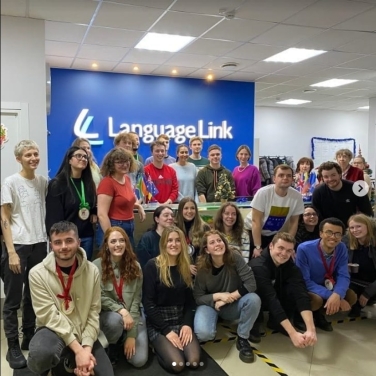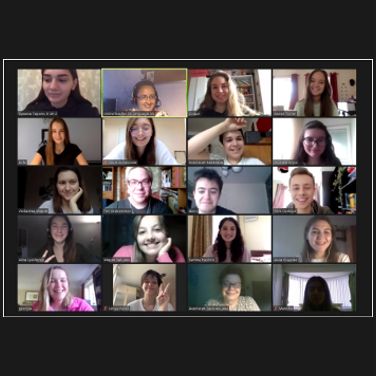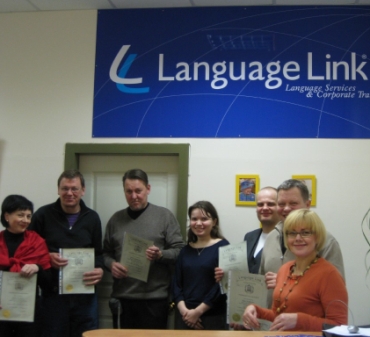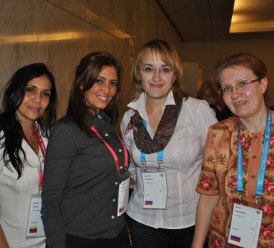Special programme for RLUS students:
Bilingual (Russian – English) and Slavonic-speaking students
Every year we take in several bilingual students and students from Eastern Europe who are native speakers of other Slavic languages. It is essential for Language Link to provide a professional approach when dealing with these students. As a result, we’ve decided to announce a special program for bilingual and Slavic language speaking students for the RLUS programme at Language Link (Moscow).
The goal of this program is to give all the students an opportunity to improve their level of Russian language significantly and to be able to pass TORFL B2 or C1 level, as well as to extend their knowledge of Russian culture.
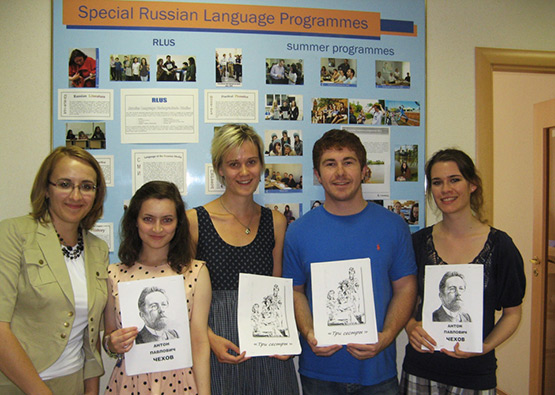
course summary
| the following courses |
|
|---|---|
| Course Schedule | 18 academic hours per week |
| Time period required to complete a program | 18 – 36 weeks |
| Group size | varies from 4 - 8 students |
| Progress and Assessment | Conversation Practice, Grammar, Translation, History, Cinema Studies, Literature, Language of the Russian Media, Phonetics etc. |
What will I be able to do after the program?
- Speak Russian fluently.
- Translate texts from English to Russian.
- Read, understand and analyse events written about in the Russian mass media.
- Watch, understand and analyse Russian films.
- Analyse and discuss the important aspects of Russian history.
- Understand the academic Russian used in textbooks and make use of this to further my progress.
1. Lexis and Grammar correction:
Most students on the traditional RLUS grammar course are taught how to build the correct grammar forms and constructions. For a group of bilingual students the task is different.
Many bilingual students can speak Russian like a native, so the key focus will be on the analysis of language forms. The students will learn Russian orthography and punctuation like Russian children do at school. As a rule, bilingual students can speak Russian fluently, but their written Russian is not at the same level. This may cause misunderstandings in the students’ written work. In order to correct this the students will:
- do exercises on orthography and punctuation,
- write essays and dictations,
- study word composition,
- learn the structure of simple and complex sentences,
- study word-formation,
- build verbal nouns, diminutive-hypocoristic forms of nouns, adjectives and adverbs.
We will also use the materials of the Unified State Exam in Russian language to give the students the possibility to evaluate their level in comparison with the requirements expected of Russian high-school graduates.
The course will include:
- Russian orthography and punctuation
This part of the program is for students who aim to avoid mistakes in their writing. We will help students to form “grammar vigilance” and achieve grammatical competence in their writing.
Students will know the fundamental rules of Russian orthography and punctuation, and these rules will help them avoid making careless errors in essays. Students will learn to write ‘difficult’ words and to use punctuation automatically. - The Syntax of complex sentences. The use of punctuation marks in complex sentences.
Bilingual students will examine the functional styles of Russian language: conversational, official, journalistic, and scientific-journalistic.
This part of the program will allow students to explore, step by step, the specifics of each functional style. Texts for analysis and creative tasks will be used to recognize the style. The tasks include exercises on lexis, grammar, speaking and writing.
During the second semester students will put these practical skills into use, making stylistic analyses of mass-media texts, TV, and public speeches of political leaders, drawing on their previous knowledge of stylistics in contemporary Russian language. The tasks include separate sentences and authentic texts with stylistic mistakes and shortcomings.
The following themes are included in the program:
- Word choice
- Lexical compatibility
- Lexical contamination
- Barbarisms
- Words with multiple meanings
- Archaisms
- Neologisms
- Tautology
- Periphrasis
The phraseological units of every language are connected with the culture, history, and traditions of the country. The aim of these lessons is to get the students acquainted with the most common fixed expressions in the Russian language and teach them to use the expressions correctly. We will focus our attention on the following phraseological units:
- identifying time (ни свет ни заря, в двух словах),
- identifying quantity (яблоку негде упасть, куры не клюют),
- identifying quality and evaluation (пальчики оближешь, как по маслу),
- describing appearance and temper (как две капли воды, звезд с неба не хватает),
- specifying the location, destination and moving direction (в двух шагах, рукой подать, вдоль и поперёк),
- expressing indifference (мне до лампочки, хоть трава не расти) and others.
2. Translation (from English into Russian).
Most students on the traditional RLUS course usually translate adapted texts from English to Russian according to their level. The course extends their vocabulary and gives the opportunity to repeat grammar points. Bilingual students will translate authentic texts. They will study journalistic and fictional texts. The task is to achieve grammatical accuracy and stylistic adequacy (we do not practice it with the other students). The orthography and punctuation will be monitored as well. In addition we will control the lexical and syntax synonymy (we do not practice it with the other students). The students will be able to compare their translations with the existing classic translations done by professional translators.
3. Key or precedential texts of Russian culture – “All Russians know them”.
These precedential or key texts are texts known by many Russians due to their cultural importance. These texts are well known in written and spoken Russian culture and can be used on special occasions. Russians have knowledge of these texts from their childhood and schooldays. They often refer to themes, situations and symbols from these texts in everyday life, and use them to enhance their communication.
For example, every Russian understands the phrase “Plushkins of all countries, become a union!”, or “The society now needs Oblomovs or Shtolts”, but these phrases make no sense to even bilingual speakers, which is why we’ve created a course with the following content:
- Russian fairy tales and cartoons;
- Well known Russian classics (Oblomov, Onegin, Tatiana Larina, Pechorin, Plushkin, Voland, Luka, Danko, Doctor Zhivago and etc.),
- Cult films (from “Ivan the Terrible” by Eisenstein to “Pokrovskie vorota” and “Ironia sud’by”),
- Russian poetry of the Silver Age,
- The Russian revolution and Russian avant-garde tendencies etc.
This course will be taught using aspects of speaking practice, essay writing, and reading.
Starting soon
| Group | Schedule | Starting from | Hours per week | Places (vacant) | Teacher |
|---|


